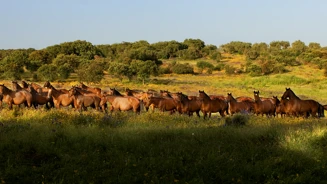Alter Stud Farm

The Alter Stud Farm was founded in 1748 within the scope of a new horse breeding policy enacted in 1708 by King João V. The Magnanimous King was displeased at the poor state of the horse stock in his kingdom and wanted Portugal to produce its own Haute Ecole riding horses instead of importing them from abroad. The idea involved setting up a special stud farm to breed only the finest horses that could then serve as the reproducers for other stud farms located throughout the kingdom. Hence, Coutada do Arneiro, a property owned by the House of Bragança, was selected as the location for the stud farm that is now the world’s longest established horse breeding centre on the same location: the Alter Stud Farm. It was left to King José I to finish the installation and structuring of the farm with its first stock made up of mares, almost all sourced from Spain.
Over the course of the 19th century, the instability prevailing throughout the national conjuncture ended up impacting on the technical and administrative dynamics in effect at the Alter Stud Farm that experienced various difficulties over the period between 1842 and 1910. When the Republic was proclaimed in the latter year, with the seizure of the Crown’s properties, the Stud Farm was transferred to the Ministry of War and renamed the Military Stud Farm. Then, in 1942, the properties and the herd were transferred to the Ministry of the Economy at a time when embarking on a process of restoration of the Alter-Real horse. In 2007, the Alter Stud Farm was merged into the Alter Real Foundation while maintaining its core mission; breeding and valuing the Alter Real Lusitano horse. After 2 August 2013, the Alter Stud Farm was transferred to the management of Companhia das Lezírias, SA and at this time, through the delegation of public service competences, attributed with the task of preserving the genetic animal heritage of the Lusitano breed, both the National Stud Farm’s genetic line as well as the Alter Real thoroughbred.
All Portuguese School of Equestrian Art horses are Lusitanos bred and raised at the Alter Real Stud Farm.
